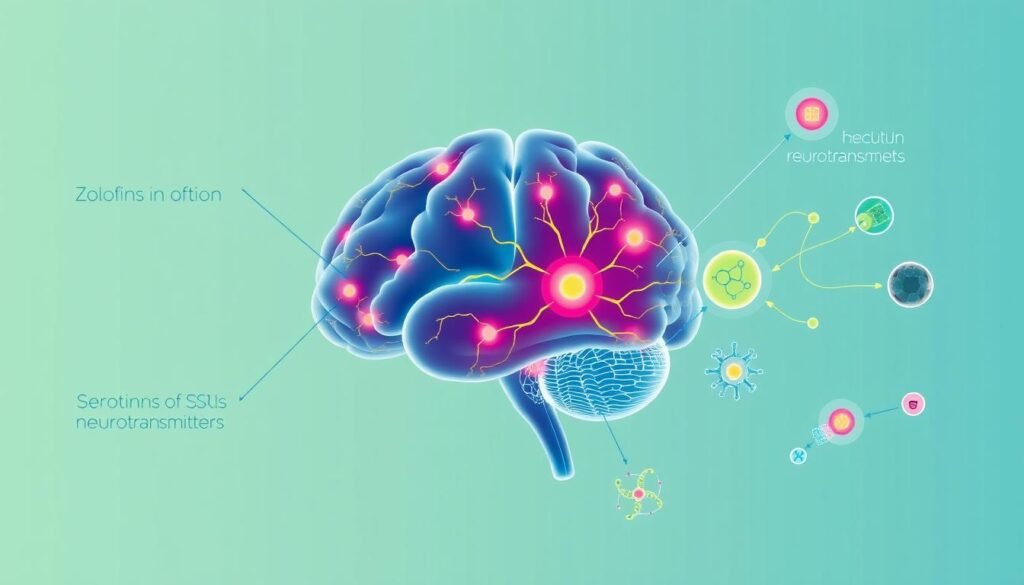About 10% of people on Zoloft, a medicine for depression and anxiety, feel very tired. Zoloft usually has fewer side effects than other similar drugs. But, feeling tired is still a big issue for many. Knowing when this tiredness from Zoloft might go away is important for those starting to use it.
Tiredness from Zoloft often starts in the first weeks of taking it. For some, this tiredness lasts even after getting used to the medicine. How long this tired feeling lasts can vary a lot. Most people start to feel less tired as their bodies get used to the medicine. We will look at how long the tiredness from Zoloft can last. We’ll also share tips on how to deal with it. For more on diagnosing and dealing with tiredness, check out this link.
Key Takeaways
- Approximately 10% of those on Zoloft may experience drowsiness.
- Fatigue can last for a few weeks after starting treatment.
- Common side effects include nausea, digestive issues, and insomnia.
- Consulting healthcare providers about persistent fatigue is essential.
- Regular exercise can help improve energy levels during treatment.
Understanding Zoloft and Its Effects
Zoloft, or sertraline, is a popular SSRI approved by the FDA. It helps with disorders like obsessive-compulsive disorder, panic disorder, and major depression. The way Zoloft works varies by person. While aiming to reduce depression and anxiety, some may face side effects.
Zoloft’s common side effect is drowsiness, less common than with other antidepressants. About 10-16% of users feel tired, especially when they start taking it as their body gets used to the medicine.
| Side Effect | Percentage of Users Affected |
|---|---|
| Nausea | 26% |
| Diarrhea | 20% |
| Insomnia | 20% |
| Drowsiness | 12% |
| Dry Mouth | 14% |
While Zoloft can be helpful, it’s important to watch for side effects. Short-term issues mostly appear in the first weeks or when changing the dose. Knowing about Zoloft’s side effects helps manage expectations and experiences in treatment.
What is Zoloft and How Does it Work?
Zoloft, also known as sertraline, is a type of SSRI medication. SSRIs are selective serotonin reuptake inhibitors. They focus on serotonin levels in the brain. By blocking the reabsorption of serotonin, Zoloft increases its availability.
This action improves mood and lowers depression symptoms. That’s why Zoloft is a popular choice for treating depression.
The connection between SSRIs and depression is important. These meds adjust brain chemicals that impact mood. This helps people cope with depression more effectively. With Zoloft, positive mood changes can happen in a few weeks, but it varies by person.
Zoloft not only boosts mood but can also affect sleep and energy. While many people feel better, some might face side effects like fatigue. Fatigue is common at the start and may last a few weeks.
Knowing how Zoloft works is useful. Keeping up with the medication helps keep serotonin levels steady. This aids in mood management over time. Staying in touch with doctors is key to handle side effects and get the best results.

When Does Zoloft Fatigue Typically Subside?
For those on Zoloft, knowing how long fatigue lasts is key. Many feel very tired at first as their body gets used to the medication. This tired feeling is common but knowing what’s coming can make things less stressful.
Initial Drowsiness and Adjustment Period
Feeling sleepy at the start of Zoloft is normal. This tiredness happens soon after beginning the medicine and may last a few weeks. It takes time for your body to adapt to new serotonin levels, making you feel worn out. Understanding this period is vital for setting your expectations right.
Expected Timeline for Fatigue Reduction
Over time, as the body adjusts, the fatigue starts to lessen. This matches what’s expected for Zoloft fatigue to go down. Most find they feel better between four to six weeks. However, if tired feelings don’t fade, talking to a doctor is important for tailored advice.
Factors Influencing Zoloft Fatigue Duration
The time and strength of tiredness from Zoloft can change a lot between people. Many factors of Zoloft fatigue are key in deciding fatigue’s length. It’s important to look at individual factors affecting fatigue like dosage, existing health conditions, and other medicines.
For example, people with sleep problems might feel tired longer. This can really affect Zoloft energy, making daily tasks hard. It’s critical to stick to the dosage the doctor prescribes; not doing so can make the tiredness worse.
Knowing how your health and Zoloft work together helps in managing. You should think about age, overall health, and life choices. These all influence how tired you feel.
| Factor | Influence on Fatigue Duration |
|---|---|
| Zoloft Dosage | Higher dosages may lead to increased fatigue in some individuals. |
| Health Conditions | Preexisting conditions like sleep disorders can prolong fatigue. |
| Medication Interactions | Certain drugs may exacerbate fatigue when combined with Zoloft. |
| Lifestyle Habits | Poor sleep, diet, and exercise habits can impact Zoloft energy levels. |

Common Side Effects of Zoloft
It’s important to know the Zoloft common side effects when starting this treatment. Patients usually want to learn about possible reactions. Drowsiness and fatigue are common concerns. Many wonder about their duration and effect on daily activities.
Drowsiness and Fatigue Statistics
Studies show that 10% to 16% of Zoloft users feel drowsy. Psychiatrists say drowsiness is a common antidepressant side effect. In the early treatment stages, drowsiness is likely. Zoloft is less likely to make you sleepy than other SSRIs like Paxil. However, it can still affect your sleep and energy because it changes serotonin levels.
Other Common Side Effects of Zoloft
The Zoloft side effects profile also includes other reactions. Some common ones are:
- Nausea
- Digestive issues
- Sleep disturbances
- Dry mouth
- Teeth grinding
- Appetite changes
- Weight changes
- Dizziness
- Increased sweating
- Erectile dysfunction
- Decreased libido
- Headaches
- Anxiety
These effects usually lessen after a few weeks. Knowing about them helps manage expectations. It also aids in seeking help when needed.
Why Does Zoloft Cause Fatigue?
Zoloft is a medication that doctors often prescribe. It’s known as a selective serotonin reuptake inhibitor (SSRI). About 10% of those who use it feel sleepy. This effect is due to how Zoloft works in the brain. It increases serotonin, which can make more melatonin.
Melatonin helps control your sleep cycle. That’s how it can make you feel tired. This link between Zoloft and tiredness is well-known.
When you start taking Zoloft, fatigue might hit you hard. But don’t worry, it usually gets better over a few weeks. Your body just needs time to adjust. Bryan Bruno, MD, pointed out Zoloft doesn’t make you as sleepy as some other drugs like Paxil. Yet, fatigue hits 20-30% of people on antidepressants.
Zoloft can also make it tough to sleep, adding to the tiredness during the day. If you can’t sleep well, you’ll likely feel more drowsy. That’s why it’s crucial to know about these effects. By doing so, you can manage them better.
To fight this tiredness, try to sleep well and exercise. Good sleep habits help a lot. Regular physical activity can boost your energy, too.
Keep an eye on how you’re feeling and talk to your doctor often, especially in the beginning. If the sleepiness doesn’t go away, you might need a different dose or a new medicine. For more tips on handling tiredness from antidepressants, click here.

Managing Zoloft Fatigue
Dealing with fatigue from Zoloft requires an integrated strategy. It’s important to balance medication, lifestyle changes, and professional advice.
Practical Tips for Coping with Zoloft Tiredness
Here are several tips to help manage Zoloft tiredness:
- Evening Dosing: Take Zoloft at night to help with sleep and cut down on daytime sleepiness.
- Regular Exercise: Moderate exercise can boost energy levels and fight off fatigue.
- Balanced Diet: Eating right supports your health and can reduce tiredness.
- Good Sleep Hygiene: A relaxing bedtime routine helps with sleep quality and reduces daytime sleepiness.
- Regular Consultations: Talk openly with your healthcare provider to adjust medication if needed.
- Alternative Therapies: Therapy and support groups can support medication and improve well-being.
If fatigue doesn’t improve or affects daily life, it’s smart to talk to a healthcare provider. They might adjust your treatment to better manage Zoloft fatigue.
| Tip | Description |
|---|---|
| Evening Dosing | Taking the medication at night may improve sleep and reduce daytime tiredness. |
| Exercise | Staying active boosts energy and lifts your mood. |
| Sleep Hygiene | A calm sleep environment leads to better rest. |
| Healthy Diet | Eating well helps maintain energy and mood. |
| Consult Healthcare Provider | Checking in regularly allows for adjustments to treatment as needed. |
When to Consult Your Healthcare Provider
If you’re starting Zoloft, watching your fatigue levels is key. Knowing when to see a doctor about Zoloft fatigue is critical. If fatigue gets worse or majorly affects your day-to-day, you may need further checks.
Regular chats with your doctor during the first few weeks can help tackle any side effects. This ensures side effects don’t badly impact your life.
Consulting a healthcare provider can shed light on whether you need a different dose or medicine. Talking about how Zoloft changes your feelings and energy is crucial. While some may see their fatigue lessen, others might need help for ongoing tiredness.
Zoloft and other antidepressants can sometimes make you more tired or sleepy. But not everyone feels this way. About 10% might get drowsy, yet Zoloft usually causes less tiredness than drugs like Paxil. Always talk to your doctor about any discomfort or worries to get care that fits your needs.
| Signs to Watch For | Action Required |
|---|---|
| Persistent fatigue lasting more than a few weeks | Consult with your healthcare provider for potential adjustments |
| Fatigue affecting daily life significantly | Immediate consultation recommended to explore alternatives |
| Exacerbated side effects or new symptoms | Report to a healthcare provider as soon as possible |
| Emotional distress or suicidal thoughts | Seek urgent help from a qualified professional |
When unsure about Zoloft’s effects, always talk to your doctor. This approach ensures you get the right support and stay involved in your care. Consulting your healthcare provider is always a good step.
Alternatives to Zoloft for Managing Fatigue
If you’re feeling tired from taking Zoloft, there are other options. It’s important to talk with a doctor to find the best solution for you. Not every treatment fits everyone.
There are different medicines that might help with fatigue. SSRIs like Lexapro and SNRIs like Effexor could work differently and may not make you as tired. Wellbutrin is known for giving people more energy, so it’s often chosen over Zoloft.
Lifestyle changes and supplements can also make a big difference in dealing with Zoloft-related fatigue. Here are some things to try:
- Regular exercise can help reduce tiredness.
- Supplements such as magnesium and Omega-3 fatty acids may fight off fatigue.
- Therapies like cognitive-behavioral therapy can effectively manage symptoms.
- Trying herbal remedies like ginseng and echinacea might offer relief.
Choosing the right treatment is a personal journey. What works for one might not work for another. A close partnership with a healthcare provider can help find the best plan for you.
| Medication | Type | Recommended for Fatigue Management |
|---|---|---|
| Lexapro | SSRI | Yes |
| Effexor | SNRI | Yes |
| Wellbutrin | NDRI | Yes |
| Celexa | SSRI | Possible |
| Buspar | Antidepressant | Possible |
Conclusion
Fatigue is often a side effect of Zoloft, but it usually doesn’t last long. Knowing the conclusion on Zoloft fatigue helps understand that improvements are on the horizon for most. Learning how to handle these side effects makes the treatment journey smoother.
Talking to your doctor about any side effects is key. This ensures that any issues are dealt with quickly. A lot of people stop their antidepressant because of side effects. That’s why it’s crucial to keep an eye on how you feel and adjust treatment if needed. For more insights, check the Zoloft fatigue summary.
Dealing with antidepressants is a team effort between you and your healthcare provider. Being open about managing Zoloft side effects means you’re more likely to do well with your treatment. It’s all about working together for better mental health.